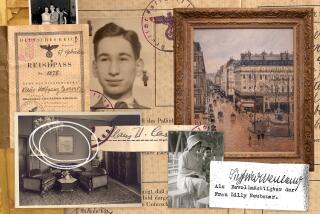Following the Money to Relatives’ WWII Fate
- Share via
LAGUNA HILLS — Beatrice Blank may be sitting on a bounty.
The Leisure World resident opened her morning newspaper several weeks ago to discover her late father’s name in an advertisement listing Swiss bank accounts belonging to descendants of Nazi Holocaust victims.
The discovery delighted Blank, but not for its promise of easy money. She says she might donate her windfall to charity.
But the notice offers Blank one last hope to answer a question that has dogged her family for almost six decades: What happened to her grandparents during the Holocaust?
Blank hopes to come closer to her quest when she attends a public gathering in Newport Beach tonight to meet Rabbi Andrew Baker, a leader in the international campaign that has pressured Swiss banks to release money deposited by individuals who later perished during the Holocaust.
Blank said she realizes the answer could bring pain instead of joy, but “this is business that needs to be finished,” she said. “It’s like closing a chapter in my life.” She’s hoping that anything that turns up in her dealing with the Swiss banks may give her some answers.
*
The pressure that precipitated the advertisement bearing her father’s name came mainly from Jewish groups solemnly commemorating the 50th anniversary of the end of World War II.
The groups, which included Baker’s American Jewish Committee, had called on Switzerland and its banks to provide a full accounting of their wartime dealings with the Nazis and the assets of Jews killed during that era.
Among them were her Austrian grandfather, Joseph Blank, a jewelry designer, and his wife.
The couple’s only son, Herman, was 20 when he came to the United States with his bride, Clara, for their honeymoon. The newlyweds never returned, and Herman later became a fashion designer in New York. He corresponded regularly with his parents--until the war.
When the letters from Herman Blank’s parents stopped abruptly, the family made daily attempts to find out what had happened to them, Blank said.
Word arrived that another relative had jumped to his death from a hotel window to escape the Nazis, causing the Blanks in New York to wonder what horrible fate the grandparents had suffered.
The youngest of seven children, Blank said she remembers vividly the anguish her family endured.
“My father was on the telephone almost every day asking friends, relatives, anyone who knew them, ‘Did you hear anything? Do you know anything? Did you hear?’ ”
Her father died in 1947 without ever finding out. Her six siblings have since died, leaving her alone to solve the mystery.
A framed black-and-white picture of the couple hangs on the wall above her bed, offering a constant reminder.
Blank, who retired to Leisure World from Manhattan four years ago, was sitting in her retirement villa several weeks ago when she spotted her father’s name among descendants of Holocaust victims with dormant bank accounts.
The advertisement provided the strongest evidence yet that her grandparents suffered at the hands of the Nazis, she said.
But she wants the whole truth. She followed the advertisement’s instruction and called a toll-free number for Ernst & Young, the accounting firm entrusted with disbursing about $52 million belonging to Holocaust victims. Blank has no idea how much her family’s share is worth.
For several weeks, Blank has been gathering documentation proving she is Herman Blank’s daughter. Her packet includes her father’s army deferment, his birth certificate and her parents’ marriage records.
Blank insisted that she is after answers--not money.
“I’ve lived without this money all my life,” said the former retail buyer. “I would give [the money] to poor people who need it. This is not about money. It’s unfinished business.”
Baker plans to meet with Blank before his address on “Swiss Banks and Jewish Retribution” at 7:30 p.m. at the Sutton Place Hotel. A resolution “means far more than the money,” Baker said. “This alone makes all the difference in the end.”
*
Contributing to this report was Times staff writer Bonnie Hayes.
More to Read
Sign up for Essential California
The most important California stories and recommendations in your inbox every morning.
You may occasionally receive promotional content from the Los Angeles Times.












